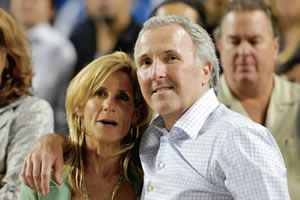Selig Responsible For Dodger Mess

Dodgers owner (for now) Frank McCourt and now ex-wife Jamie in happier times. AP photo
Last week while flipping through the channels, I happened upon celebrity chef and noted man of anger Gordon Ramsey as he revisited a New York City restaurant to check on those he counseled. The establishment failed after one of the angry owners turned his back on the restructuring plan, and in the great tradition of mismanagers everywhere, let his ego get in the way of smart business practices. At least that’s what was shown.
This got me thinking about Dodgers owner Frank McCourt, who did everything but fly to Sicily for risotto as he squandered millions. Don’t we all have the God-given right to fail miserably while maintaining a ego that prevents us from accepting blame?
It would seem so. Unless, of course, your business is part of an organization whose charter allows for an outside agent to make financial decisions that would warrant a phone call from the Justice Department had it been in any other industry.
By now you know the story. McCourt purchased the team with money he didn’t have, and turned the franchise that gave us Jackie Robinson and the most over-hyped and worst-tasting hot dogs into a blueand-white checkbook from which to he went on a Bernie Madoff-style spending spree. McCourt figured that if he could borrow money to purchase the team, he could do the same to bail himself out of financial difficulty. It’s a timetested process. Spend your way into bankruptcy, then spend even more to buy your way back into solvency.
And why shouldn’t he go that route?
If the financial crisis has taught us anything, it is that increased debt burden, incorrect pricing of risk and liquidity shortfalls aren’t death sentences and can, in fact, be used to generate even more revenue to misspend.
But where the financial industry had a compliant and nearly complicit federal government willing to spend whatever was necessary to prevent a global financial meltdown, baseball has only Bud Selig. And that’s pretty much the same thing.
Much of the nation’s financial woes were created by lack of government oversight and an everyone-qualifies-for-a-mortgage philosophy. With the Dodgers, it was Selig’s need to pacify a broadcast network and to find an owner who would submit to Selig’s head-in-the-sand philosophy.
Fox Entertainment Group convinced the commissioner that McCourt was a standup guy, and even loaned the parking lot baron the money to purchase the team. If allowing a person to borrow money from the very company he is purchasing isn’t bad enough, Selig conveniently ignored baseball’s 60/40 rule that limits a team’s debts to 40 percent of its value.
McCourt borrowed nearly the entire $430 million sale price from Fox, making the team’s debt to revenue balance more than slightly skewed to the negative. But that didn’t matter.
Now it does.
Why?
Because the Selig style of management is to ignore problems until they blow up, and then do as little as possible to correct the errors.
The Dodgers are no different than instant replay. After years of bad calls, Selig allowed for the inclusion of the review system, but only on a limited bases and concentrated on only those that got the worst press. He is doing the same with the Dodgers.
The commissioner has made it clear that McCourt is bad for the game and that he must be forever banned from the league. Selig’s right. McCourt is an embarrassment and needs to be shown the door.
But McCourt is not the cause of all the Dodgers’ problems. He’s a symptom of failed leadership.
Selig handed over the team to a guy who didn’t have the money to pay for his purchase.
He did much the same in San Diego when he allowed a group of unnamed partners to buy the team on credit. Selig didn’t do any better in Texas, where he allowed the sale of the team through a bankruptcy court, even though baseball rules allow the league to take over a team should it file for bankruptcy. Evidently he figured it was safer to let someone else handle the sale than letting it fall into the hands of Dallas Mavericks owner Mark Cuban, who has the cash and experience to be what baseball lacks an effective and free-thinking owner.
One has to wonder. What would Ramsey do?



